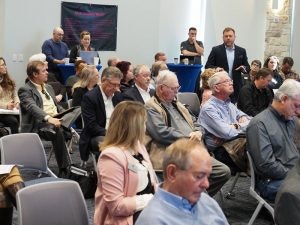Surveys could help expand high-speed internet into rural areas
By Daniel Clifton
With more than 100 people — government officials, business owners, residents — packed into the meeting room at the Pedernales Electric Cooperative’s Marble Falls office January 31, it was clear that rural broadband internet access matters.
“Our area needs broadband. Period,” said Burnet County Judge James Oakley at the start of the stakeholders meeting organized by Connected Nation Texas, a nonprofit with the mission of expanding high-speed internet into rural parts of the state.
It is a subsidiary of Connected Nation, which creates broadband internet solutions for rural and underserved communities across the United States.
Tom Stephenson of Connected Nation Texas explained the purpose of the meeting: working to get broadband internet to homes in Burnet, Blanco, and Llano counties that don’t have access to it. The first step, he said, is learning about the current internet landscape.
On January 31, Connected Nation Texas opened surveys in each of the three counties to gather information about internet access. The group is asking for input from residents, businesses, agriculture groups, health care entities, schools, libraries, organizations, public safety officials, and government leaders. Stephenson added that people who fall into two or more categories are encouraged to participate in each applicable survey.
For example, teachers can take a school survey as well as a household one.
And, if you live in one of the three counties and work in another, Stephenson said to complete surveys for both areas.
The Federal Communications Commission recognizes high-speed, or broadband, internet service as one that offers a download speed of at least 25 megabits per second and an upload speed of 3 Mbps.
A lack of high-speed internet is a major issue in rural areas across the nation. Having access to broadband offers a wealth of benefits, especially in education and business.
According to Stephenson’s data, about 50 percent of students in K-12 lack internet access and 42 percent of those surveyed students said they received lower grades because of that.
“This is a major driving factor,” he said of broadband’s impact on education and why rural access is so important.
Data has also revealed that about 36 percent of Texans work from home, which often requires reliable, high-speed internet.
A lack of broadband access can hamper economic growth, sometimes being a barrier to businesses moving to or thriving in a community.
 The January 31 meeting was a jumping-off point. Stephenson said Connected Nation Texas will begin assessing the three counties’ “technology landscape” through the surveys, develop a plan, and “implement projects to expand broadband” in the area.
The January 31 meeting was a jumping-off point. Stephenson said Connected Nation Texas will begin assessing the three counties’ “technology landscape” through the surveys, develop a plan, and “implement projects to expand broadband” in the area.
After survey results are gathered, the planning phase should begin in June or July, according to Stephenson.
But first things first: getting as many people as possible to complete the surveys.
Surveys can be found at the following links: Burnet County, Blanco County, and Llano County. They take about 10 minutes to complete.
Oakley said he hopes everyone at the meeting begins spreading the word about the surveys.
“There’s a lot of good ways to get the word out, and that’s the mission of this today,” he said.
In the new decade and beyond, broadband internet is no longer a luxury.
“It’s more than a want,” said David McCullough of Johnson City. “It’s become a basic utility.”
Check it out on DailyTrib.com






